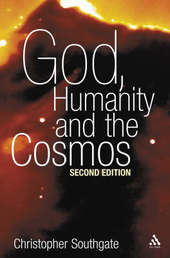
|
God, Humanity and the Cosmos: A Companion to the Science-Religion Debate
Hardback
Main Details
| Title |
God, Humanity and the Cosmos: A Companion to the Science-Religion Debate
|
| Authors and Contributors |
Edited by Dr. Christopher Southgate
|
| Physical Properties |
| Format:Hardback | | Pages:470 | | Dimensions(mm): Height 234,Width 156 |
|
| Category/Genre | Philosophy of religion
Christian theology
General |
|---|
| ISBN/Barcode |
9780567041449
|
| Classifications | Dewey:201.65 |
|---|
| Audience | | Undergraduate | | Postgraduate, Research & Scholarly | | Professional & Vocational | |
|---|
| Edition |
2nd edition
|
|
Publishing Details |
| Publisher |
Bloomsbury Publishing PLC
|
| Imprint |
T.& T.Clark Ltd
|
| Publication Date |
29 October 2005 |
| Publication Country |
United Kingdom
|
Description
Contributors include: Christopher Southgate John Hedley Brooke Celia Deane-Drummond Paul D. Murray Michael Robert Negus Lawrence Osborn Michael Poole Jacqui Stewart Fraser Watts David Wilkinson This fully revised and updated edition of God, Humanity and the Cosmos includes new chapters by John Hedley Brooke, Paul D. Murray and David Wilkinson. In addition to a systematic exploration of contemporary perspectives in physics, evolutionary biology and psychology as they relate to theological descriptions of the universe, humanity and consciousness, the book now provides a thorough survey of the theological, philosophical and historical issues underpinning the science-religion debate. Contributors also examine such issues as theological responses to the ecological crisis and to biotechnology; how science is treated and valued in education; and the relation of science to Islamic thought. Dr Christopher Southgate is Lecturer in Theology at the University of Exeter.'
Author Biography
Dr. Christopher Southgate is Research Fellow in Theology at the University of Exeter in England.
Reviews"this new edition [is] the most broadly-based, maturely considered and lucidly written science-religion overview in the English language. For me, as for Arthur Peacocke, quoted on the cover, it is 'an irreplaceable resource'."-Neil Spurway, ESSSAT News 16.2 -- Neil Spurway, ESSSAT News "Bringing together an all-British cast of eight academics with specialties in theology, biochemistry, genetics and science education, Southgate has designed a resource ideal for science-and-religion courses. Several student or reader exercises are spread throughout the text." - Science & Theology News, October 2005 -- Science & Theology News 'The first edition of this work was unique, in the science-and-religion field, of being a text eminently suitable both for beginners and for those working at its frontiers. This second edition eminently manifests the same admirable qualities by containing chapters - especially valuable for newcomers -expanding the history of the field and by critically surveying contentious issues which have arisen since the first one - such as the nature of divine action, panentheism, kenosis,and biotechnology. An irreplaceable resource.' -- Dr Arthur Peacocke, Ian Ramsey Centre, Oxford * Blurb from reviewer * Praise for the first edition: 'This comprehensive work has the rare virtue of combining readableness with accurate and detailed judgements on the outstanding issues in past and contemporary interactions between science and religion. It is both the book for students we have been waiting for and also a refreshing survey of the field for those currently engaged in it.' Dr Arthur Peacocke, Ian Ramsey Centre, Oxford * Blurb from reviewer * 'Not only is God, Humanity and the Cosmos directly addressed to teachers and students, and as such manages to be remarkably accessible; it also carefully addresses all the contemporary issues in the field, but in such a way that it moves the theology and science debate to the cutting edge of the current conversation.' Professor J. Wentzel van Huyssteen, Princeton Theological Seminary * Blurb from reviewer * The second edition maintains the five-book organizational structure, with book 1 expanded to include more introductory material related to the science and religion debate. The authors have preserved the suggested discussion exercises and the "note for teachers." The text contains numerous chapter citations for extended treatments of the topics in view, and is replete with notes and references. This book is an important core text for undergraduate or graduate courses in science and religion. Summing Up: Highly recommended. Lower-division undergraduates and up. -- J.A. Hewlett, Finger Lakes Community College * Choice *
|